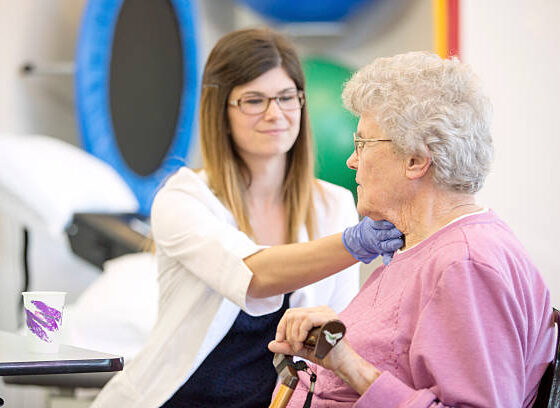Mentally stimulating activities after age 70 found associated with decreased risk of new-onset mild cognitive impairment (photo credit: Mayo Clinic)
Mayo Clinic researchers have found that engaging in mentally stimulating activities, even after age 70, was associated with decreased risk of new-onset mild cognitive impairment (the intermediate stage between normal cognitive aging and dementia) over an average study period of 4 years.
The study discovered that for cognitively normal people 70 or older, the risk of new-onset mild cognitive impairment decreased by 30 percent with computer use, 28 percent with craft activities, 23 percent with social activities, and 22 percent with playing games — at least one to two times per week.*
The researchers found that persons who performed these activities had less cognitive decline than those who engaged in the same activities only two to three times per month or less,” says Yonas Geda, M.D., psychiatrist and behavioral neurologist at Mayo Clinic’s Arizona campus and senior author of the study.**
“Even for a person who is at genetic risk for cognitive decline***, engaging in some activities was beneficial,” says Janina Krell-Roesch, Ph.D., the first author of the study and a postdoctoral researcher in Dr. Geda’s Translational Neuroscience and Aging Program (TAP).
The results are published in an open-access article in the Jan. 30 edition of JAMA Neurology. Video.
* The researchers followed 1,929 cognitively normal participants of the population-based Mayo Clinic Study of Aging in Olmsted County, Minn., for an average duration of four years. The researchers conducted a neurocognitive assessment at the time of enrollment in the study, with evaluations every 15 months. They adjusted for sex, age and educational level. Following the assessment, an independent expert consensus panel at the Alzheimer Disease Research Center at Mayo Clinic made the classification of normal cognition or mild cognitive impairment for each study participant, based on published criteria.
** The researchers note in the paper that a limitation of the study “pertains to potential recall bias that stems from the questionnaire on self-reported mentally stimulating activities. Also, we did not control for mentally stimulating activities performed in early life or mid-life. We can assume that individuals who engaged in mentally stimulating activities in early life or mid-life are more likely to engage in these activities in late life compared with persons who did not engage in these activities during the life span. Furthermore, an observational study like ours allows investigating associations but does not permit drawing conclusions about cause and effect, which can only be done by interventional (experimental) studies. Therefore, we cannot exclude a ‘reverse causality’ explanation (i.e., it is possible that participants who are at higher risk for MCI are less likely to engage in mentally stimulating activities).”
*** The benefits of being cognitively engaged were even seen among apolipoprotein E (APOE) ε4 carriers. APOE ε4 is a genetic risk factor for mild cognitive impairment and Alzheimer’s dementia. However, for APOE ε4 carriers, only computer use and social activities were associated with a decreased risk of mild cognitive impairment.
Abstract of Association Between Mentally Stimulating Activities in Late Life and the Outcome of Incident Mild Cognitive Impairment, With an Analysis of the APOE ε4 Genotype
Importance Cross-sectional associations between engagement in mentally stimulating activities and decreased odds of having mild cognitive impairment (MCI) or Alzheimer disease have been reported. However, little is known about the longitudinal outcome of incident MCI as predicted by late-life (aged ≥70 years) mentally stimulating activities.
Objectives To test the hypothesis of an association between mentally stimulating activities in late life and the risk of incident MCI and to evaluate the influence of the apolipoprotein E (APOE) ε4 genotype.
Design, Setting, and Participants This investigation was a prospective, population-based cohort study of participants in the Mayo Clinic Study of Aging in Olmsted County, Minnesota. Participants 70 years or older who were cognitively normal at baseline were followed up to the outcome of incident MCI. The study dates were April 2006 to June 2016.
Main Outcomes and Measures At baseline, participants provided information about mentally stimulating activities within 1 year before enrollment into the study. Neurocognitive assessment was conducted at baseline, with evaluations at 15-month intervals. Cognitive diagnosis was made by an expert consensus panel based on published criteria. Hazard ratios (HRs) and 95% CIs were calculated using Cox proportional hazards regression models after adjusting for sex, age, and educational level.
Results The final cohort consisted of 1929 cognitively normal persons (median age at baseline, 77 years [interquartile range, 74-82 years]; 50.4% [n = 973] female) who were followed up to the outcome of incident MCI. During a median follow-up period of 4.0 years, it was observed that playing games (HR, 0.78; 95% CI, 0.65-0.95) and engaging in craft activities (HR, 0.72; 95% CI, 0.57-0.90), computer use (HR, 0.70; 95% CI, 0.57-0.85), and social activities (HR, 0.77; 95% CI, 0.63-0.94) were associated with a decreased risk of incident MCI. In a stratified analysis by APOE ε4 carrier status, the data point toward the lowest risk of incident MCI for APOE ɛ4 noncarriers who engage in mentally stimulating activities (eg, computer use: HR, 0.73; 95% CI, 0.58-0.92) and toward the highest risk of incident MCI for APOE ɛ4 carriers who do not engage in mentally stimulating activities (eg, no computer use: HR, 1.74; 95% CI, 1.33-2.27).
Conclusions and Relevance Cognitively normal elderly individuals who engage in specific mentally stimulating activities even in late life have a decreased risk of incident MCI. The associations may vary by APOE ε4 carrier status.
Article originally appeared here: http://www.kurzweilai.net/mayo-clinic-researchers-find-mentally-stimulating-activities-after-age-70-associated-with-lower-new-cognitive-impairment-risk










